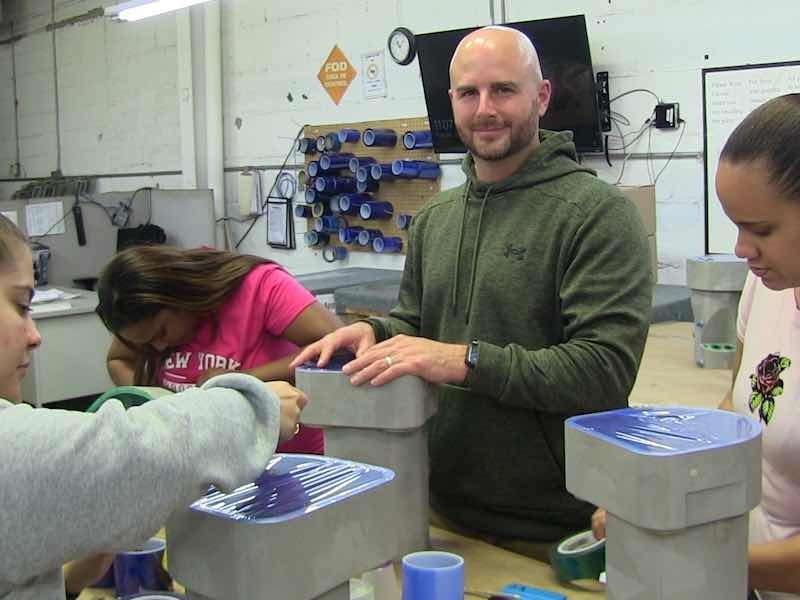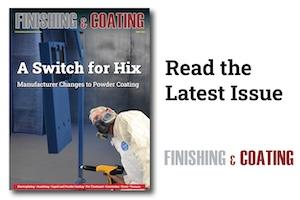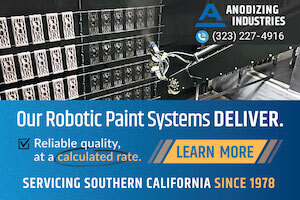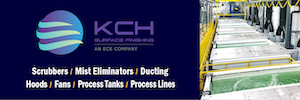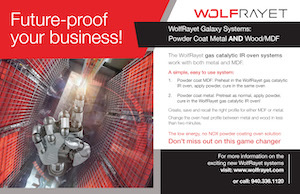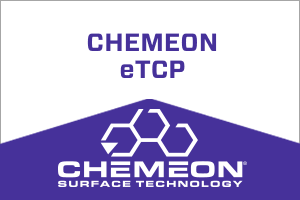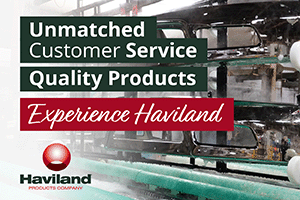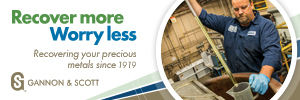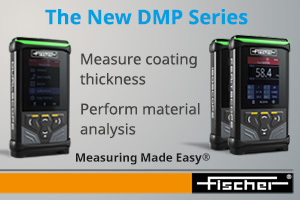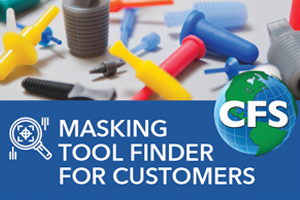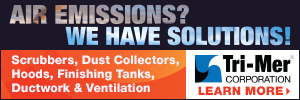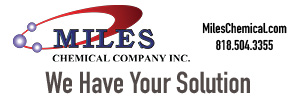What do you get when you take one of the top anodizing researchers in the world and put them in a niche anodizing applicator?
The result is Peter Totaro, PhD., and Aerotech Processing Solutions in Paterson, New Jersey, a special processing facility serving the aerospace, defense, and other high-tech industries in a 30,000-square-foot facility.
Totaro is the Vice President at the NADCAP-certified aerospace processing firm that provides Types I, II, and III anodizing, chemical conversion, passivate, electroless nickel, non-destructive testing, and painting.
He is also the author of numerous and extensive research papers on anodizing — his Doctorate focused on “Effect of Current Density Ramping on the Anodic Reaction and Morphology of Aerospace Aluminum Alloys” — which is a rarity among shops that perform finishing process and are willing to share their secrets.
‘An Asset for Your Company’
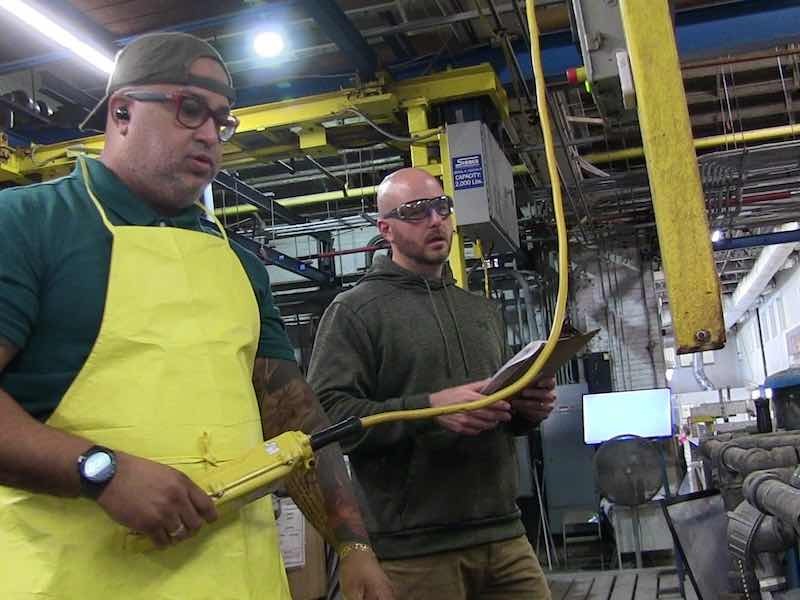 At right, Peter Totaro, PhD., Vice President at Aerotech Processing Solutions in Paterson, New Jersey.“I love to emphasize to customers that when you partner with Aerotech, you gain our technical knowledge as well as a processing house,” Totaro says. “Use me as an asset for your company to help troubleshoot problems for all other finishes and environmental issues. Even if some of the problems occurring do not concern parts that Aerotech processed, we still want to help solve these issues. One of our main goals is to build partnerships with our customers and all associated primes.”
At right, Peter Totaro, PhD., Vice President at Aerotech Processing Solutions in Paterson, New Jersey.“I love to emphasize to customers that when you partner with Aerotech, you gain our technical knowledge as well as a processing house,” Totaro says. “Use me as an asset for your company to help troubleshoot problems for all other finishes and environmental issues. Even if some of the problems occurring do not concern parts that Aerotech processed, we still want to help solve these issues. One of our main goals is to build partnerships with our customers and all associated primes.”
Aerotech works with some of the highest-level companies and OEMs in the world, including Aerojet Rocketdyne, Arkwin, BAE Systems, Boeing, Breeze-Eastern, Circor, Collins Aerospace, Eaton, Honda, Lockheed Martin, Marotta Controls, Medtronic, Northrop Grumman, Parker Hannifin, Rafael, Rolls Royce, Sikorsky, SpaceX, United Launch Alliance, and United Technologies – Goodrich.
Jeffrey Almeyda is the owner and CEO of Aerotech, which has about 57 employees who have earned and maintained NADCAP Merit Status. Almeyda also owns Master Metal Finishing, the first of his companies that performs plating operations for the commercial sector.
Almeyda has been involved in the plating business since the early 1990s, and with his expertise — and Totaro’s research and involvement in the anodizing trade groups — Aerotech has grown its business and its know-how in both the technical and application side of anodizing.
At just 36, he has built up an incredible reputation and credibility that many major OEMs have taken notice of. Totaro says he wishes more in the finishing industry would share research and network their discoveries to help build and protect better products in aerospace, defense, automotive, medical, and other applications.
“Having a PhD is an accomplishment and does give credibility, but my focus is to ensure that we’re giving back knowledge to the industry,” Totaro says. “Yes, I want to be used as a resource in the industry. It’s nice to know that people receive my information and knowledge well to help them solve an industry issue. “
Master Metal Finishing and Aerotech
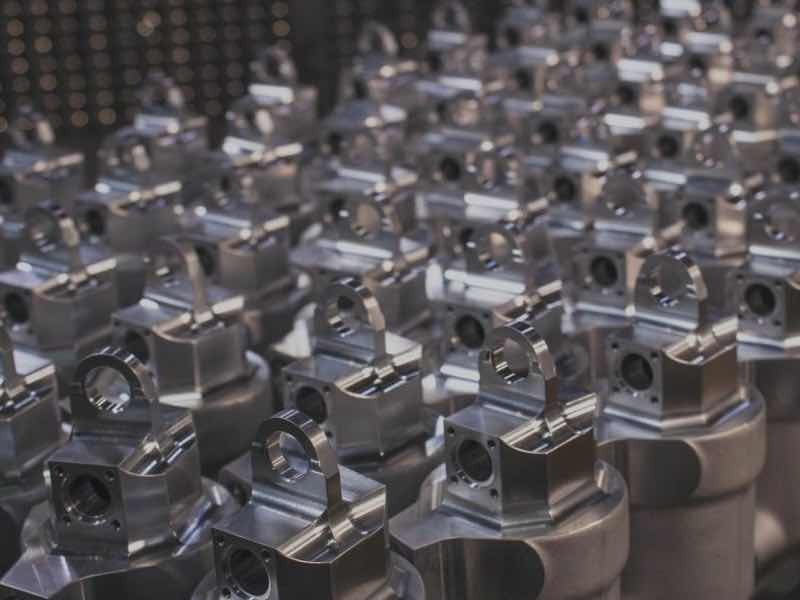 Aerotech provides Types I, II, and III anodizing, chemical conversion, passivate, electroless nickel, non-destructive testing, and painting.Almeyda’s family founded Master Metal Finishing in 1962 in Woodside, New York, and moved to Paterson in 2007. In 2011, flooding from the nearby Passaic River caused by Hurricane Irene put almost four feet of water in their facility and forced them to shut down for four months.
Aerotech provides Types I, II, and III anodizing, chemical conversion, passivate, electroless nickel, non-destructive testing, and painting.Almeyda’s family founded Master Metal Finishing in 1962 in Woodside, New York, and moved to Paterson in 2007. In 2011, flooding from the nearby Passaic River caused by Hurricane Irene put almost four feet of water in their facility and forced them to shut down for four months.
As a result of the damage, NADCAP and Boeing, among others, pulled their accreditation from Master Metal Finishing. During this time, Totaro was a chemist at Master Metal, and he stayed on staff and helped analyze tanks while Almeyda rebuilt the facility and image of the company.
Almeyda formed Aerotech Processing Solutions in 2012 to perform chemical processing applications for the aerospace sector. They soon passed the NADCAP audit and attained their lost accreditations, and both shops were off and running. In 2021, Nelson Lasso — now President and Chief Financial Officer — was hired to manage and bring expertise to the administrative side of the business.
Totaro says Aerotech is one of the only shops in the region that’s vertically integrated, where customers can drop off a part for liquid penetrant inspection — a form of non-destructive testing — and have it chem filmed, anodized hard coat, Teflon sealed, or painted in the same facility.
Together, Almeyda, Lasso, and Totaro are all contributing their respective expertise, and the result is that the shop keeps growing and expanding. Honeywell and GE accreditation are due sometime this year, and the shops have maintained their NADCAP Merit Status for the past 24 months. Turnaround times and policies have also improved dramatically.
“We definitely turned it around, and we’re very technically sound with our processing, especially hard anodizing, and we feel Aerotech is in a good position to grow,” Totaro says. “We believe we have the knowledge and expertise to process any type of part. We understand the mechanism of coating formation, as well as the state variables’ contribution to the reaction. Understanding these principles allows us to have a competitive edge when processing.”
Research Papers on Aluminum Anodizing
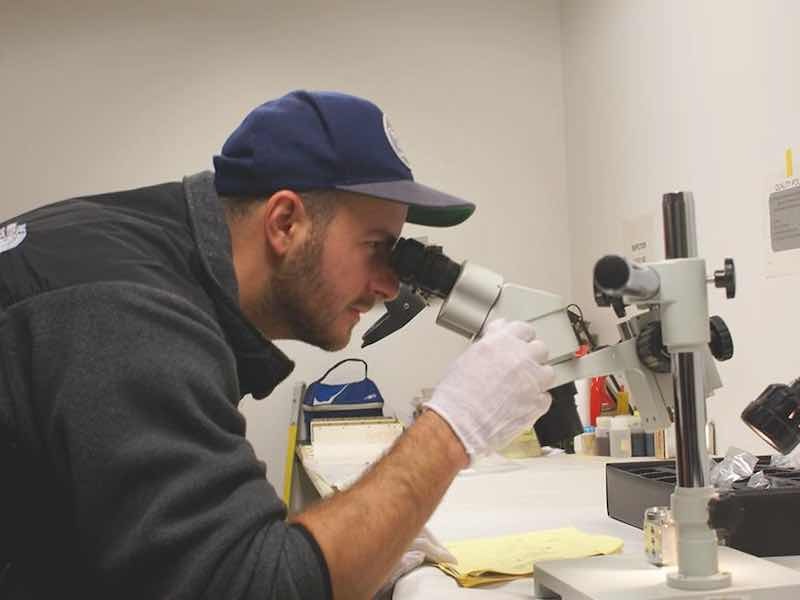 Totaro’s Doctorate is based on manipulating current to get the desired product during the anodizing process.In fact, the foundation of Totaro’s Doctorate is based on manipulating current to get the desired product during the anodizing process. Two of his papers — ‘Effect of Current Density Ramping on the Growth Rate and Structure of AA2024-T3’ and ‘Multistep Anodization Of 7075-T6 Aluminum Alloy’ — have been published by www.FinishingAndCoating.com that deal with the subject, as well as ‘Deoxidizing Aluminum and its Effectiveness as a Pre-Treatment for Anodizing Aluminum Alloy.’
Totaro’s Doctorate is based on manipulating current to get the desired product during the anodizing process.In fact, the foundation of Totaro’s Doctorate is based on manipulating current to get the desired product during the anodizing process. Two of his papers — ‘Effect of Current Density Ramping on the Growth Rate and Structure of AA2024-T3’ and ‘Multistep Anodization Of 7075-T6 Aluminum Alloy’ — have been published by www.FinishingAndCoating.com that deal with the subject, as well as ‘Deoxidizing Aluminum and its Effectiveness as a Pre-Treatment for Anodizing Aluminum Alloy.’
“The goal was to understand how the alloy and forming aluminum oxide respond to the current,” Totaro says, adding that using this approach, unique methods of applying current can manipulate ion movement and allow for more successful processing, especially with difficult alloys like 2xxx and 7xxx series.
Using principles and equations like Ohm’s Law and the Tafel Equation, it becomes apparent that minimizing the overall resistance of the reaction is most important. This is why physical maintenance is so important, Totaro says, like minimizing corrosion and loose contacts while having a strong understanding of solution analysis.
Even then, Totaro says some in the industry still have trouble anodizing some parts.
“As the aerospace industry matures, newer and more exotic alloys and requirements are becoming the norm. I’ve seen in my career a dramatic increase in customer requirements that pertain to specific features of the part, such as maintaining a particular surface finish or holding tight tolerances,” he says. “These parts are typically very expensive, and a lot of time goes into making them. In many cases, you only have one shot to get it right as reworking parts can be extremely difficult, even if allowed.”
Accompanied by the fast turnaround required in the industry, Totaro says it can make these situations rather stressful.
“This is why a real understanding of the mechanisms of the anodic reaction is becoming more and more necessary,” he says.
Becoming Involved in Industry Groups
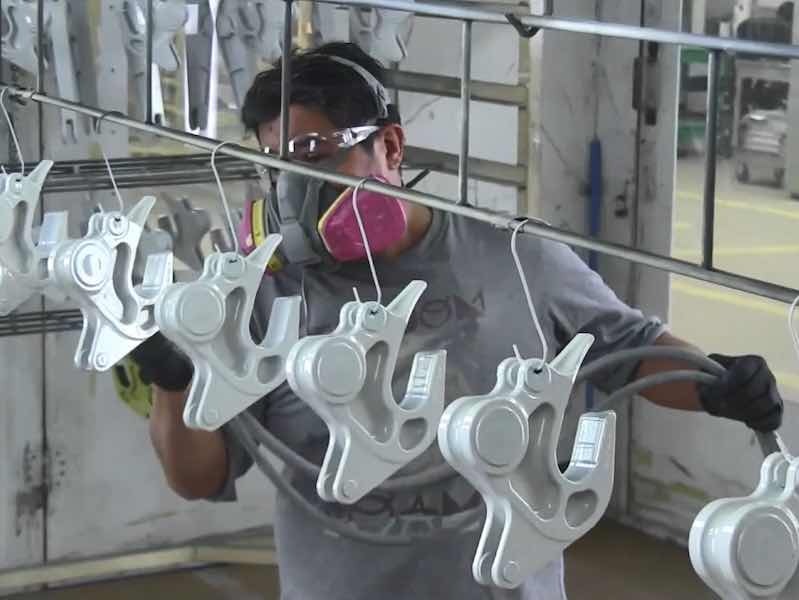 After his undergrad, Totaro received his Master of Science from the New Jersey Institute of Technology in 2016 and followed up with his Doctorate there in 2022. He is becoming more involved in industry groups — such as the Aluminum Anodizing Council and the National Association for Surface Finishing, where he sits on the board of their New York and New Jersey Masters’ Association of Metal Finishers.
After his undergrad, Totaro received his Master of Science from the New Jersey Institute of Technology in 2016 and followed up with his Doctorate there in 2022. He is becoming more involved in industry groups — such as the Aluminum Anodizing Council and the National Association for Surface Finishing, where he sits on the board of their New York and New Jersey Masters’ Association of Metal Finishers.
But more importantly, Totaro is working hard to get his customers to understand how seriously Aerotech takes its work and how they are always striving for innovation to solve issues that come up with anodizing and corrosion protection.
He is working to get that message across to customers — especially the bigger name OEMs — and hoping they hear it: that speed and turnaround aren’t always the best measure of a great finisher, but rather the expertise and technology they are using to get the parts finished correctly.
“I want customers to send us work and feel comfortable that they’re getting state-of-the-art technology and understanding going into their work,” Totaro says. “We do not just dip it and ship it. We really pay attention to the technical aspect to make sure the parts are performing as intended in the field.”
Visit https://www.aerotechprocessing.com and http://www.mastermetal.com




